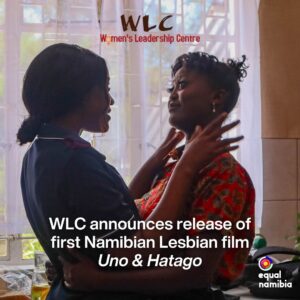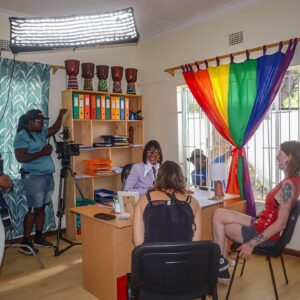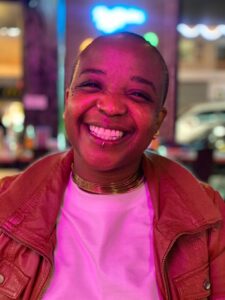There’s something beautifully complex, textures in ways that can’t always be explained but felt and layered about seeing yourself in a movie; seeing parts of yourself or all of yourself, your experiences unfolding or staring back to you, and leaning into a storyline that says, “we see you.” That’s what Uno and Hatago gave me that moment. I felt held, seen and affirmed.
The site of this experience? The ILGA World Conference in Cape Town, South Africa, in November 2024 which brought together a colourful community of LGBTQI+ activists, advocates, researchers, artivists and filmmakers from different corners of the world to exchange ideas, lessons and strategies for advancing equality, human rights and the pursuit for justice. The week-long event shared diverse themes and sessions, but one stood out for me because of its rawness and urgency: the use of film as an advocacy tool to amplify the voices of lesbians in Namibia.
Uno and Hatago is a love story about two Namibian lesbians navigating love, homophobia, violence, patriarchy, life and healing. At its core, it is a testament to the creativity, relentless courage, audacity, tenacity, power and struggles of the community of LBQ+(Lesbian, Bisexual, Queer +) that dare to tell their stories and resist through storytelling. This movie encapsulates the dual nature of visibility for LBQ+ communities. On one hand, it can educate and inspire, while on the other, it can potentially expose LBQ+ people to heightened risks of violence and stigma.
 Reflecting on the choice to tap into storytelling, Nadia shares that “written word, art, and movies, in particular, carry a unique ability to go beyond barriers of language, culture, and geography”. In a world where our imagination is shaped by dominant heteronormative and bigotry social scripts, stories like this are critical for bringing those of us who live in the margins to the centre. Stories told on and off screen have a way of evoking empathy and humanising LBQ+ people’s experiences that are often misunderstood, undermined or ignored. Uno and Hatago exemplifies this transformative power of storytelling. By centring on two women navigating their love amidst systemic homophobia and the trauma of sexual violence, the film offers an intimate glimpse into the intersection of queerness, gender, and cultural expectations.
Reflecting on the choice to tap into storytelling, Nadia shares that “written word, art, and movies, in particular, carry a unique ability to go beyond barriers of language, culture, and geography”. In a world where our imagination is shaped by dominant heteronormative and bigotry social scripts, stories like this are critical for bringing those of us who live in the margins to the centre. Stories told on and off screen have a way of evoking empathy and humanising LBQ+ people’s experiences that are often misunderstood, undermined or ignored. Uno and Hatago exemplifies this transformative power of storytelling. By centring on two women navigating their love amidst systemic homophobia and the trauma of sexual violence, the film offers an intimate glimpse into the intersection of queerness, gender, and cultural expectations.
In a world where LGBTQI+ rights are still heavily contested, especially across Africa during a time we’re seeing the anti-rights movements sweep across the continent, such movies act as critical tools of resistance and protest. They shine a light on realities and experiences often cloaked in silence and fear. Nadia remembered how “audiences who are unfamiliar with the challenges faced by LBQ+ communities in Namibia, the film provides an entry point into understanding the personal and political struggles of LBQ+ women. It demands that viewers reckon with, interrogate and reflect on the violence and discrimination perpetuated by patriarchal norms and legal systems, as well as how they have contributed to oiling machines of discrimination and oppression.
At the same time, for queer audiences, especially those in similar contexts, the film serves as a beacon of validation and solidarity. It affirms that our stories matter, that we are not alone in our shared and different struggles, and that love, community and resilience exist even in the face of profound adversity, even though many of us are tired of being forced to be resilient, searching for the silver lining and survive for the sake of surviving.
With all the beauty the movie presents us with, there is also the reminder and reality of the double-edged sword of visibility, which many LGBTQI+ activists constantly have to navigate, even in queer spaces.
Occupying these spaces, taking up roles in films does not come without consequence. This visibility has the potential to provoke backlash in society and communities where homophobia, heteronormativity, cissexism and patriarchy are deep-rooted. LBQ+ women and queer people generally, who are portrayed in, or connected with, such films are often exposed to dangerous and impassioned scrutiny, harassment and violence. Activists and filmmakers risk being labelled as “Westernized” or as destructive agents of cultural erosion, allegations that can undermine their work, its necessity and further isolate them from their communities.
The film’s exploration of sexual assault also underscores the precarious position of LBQ+ people in patriarchal societies, where their bodies are often sites of violence, deemed as possessions to be owned and threats to patriarchy. Curative r*pe – a gruesome act of violence justified under the guise of “correcting” our sexuality – is a painful and scary reminder of how visibility can make LBQ+ victims. Films that spotlight these realities are invaluable, but they also risk re-traumatising survivors or increasing the harm we already have to navigate by heightening our experiences to people who may not fully understand the context and what it means for us in our everyday lives.
The ILGA World Conference created a space for thought-provoking conversations about how to navigate the complexities of visibility in our advocacy work. One key takeaway was the need to take seriously the safety and agency of those who choose to share their stories and give us permission to witness them. This includes being intentional about ensuring that the people represented in films meaningfully engage and collaborate in the meaning-making and storytelling process, with their consent, standpoints, and boundaries respected at every stage.
This also means unsettling a culture of viewing or settling with visibility as an absolute advantage. While raising awareness is critical and lifegiving to many of us, it is similarly critical that we collectively address the structural and cultural systems that make visibility synonymous with danger. Those of us committed to reimaging, imagining and shaping a world grounded in justice and equality must work to pull apart systems of oppression that render queer people and lives unworthy of life, pleasure and dignity while celebrating and sharing our stories.

The global LGBTQI+ community, particularly white people that show up at forums like ILGA World, have an important role to play in amplifying queer voices and experiences in ways that do not undermine us or speak on behalf of us from regions like Namibia while being aware of the risks associated with global visibility. Solidarity needs to go beyond appreciation for artistic achievements and creativity; it must translate into tangible support for local activists and communities.
Uno and Hatago is an illuminated testament to the power of storytelling in the fight for LGBTQI+ rights and highlighting the distinct experiences of LBQ+ people. Its ability to turn a film screening into a learning moment, move us and connect people draws attention to the power of using art as a tool for advocacy.
As we celebrate and reflect on the past and current steps we’ve made to visibalise queer representation, we cannot afford not to be conscious about the safety and well-being of the stories we share. Our advocacy should always be rooted in solidarity, ethics of care and compassion with an unnegotiable commitment to disassembling the structures that make visibility a double-edged sword. Only then can we create a world where queer love in all its colourfulness, complexity and queerness can be celebrated.
 Mamello Sejake is a wildflower, a Black queer decolonial feminist writer, researcher, activist and an Afro fairy. Their research interests and writing are dedicated to queer storytelling; exploring the politics of sexualities; identity politics; gendered dynamics; and, the complexities, contradictions and politics of kink.
Mamello Sejake is a wildflower, a Black queer decolonial feminist writer, researcher, activist and an Afro fairy. Their research interests and writing are dedicated to queer storytelling; exploring the politics of sexualities; identity politics; gendered dynamics; and, the complexities, contradictions and politics of kink.
This piece is part of our African Feminist Takes from the 31st ILGA World Conference. Between 11 to 15 November 2024, the ILGA World Conference was hosted in Africa for the first time in 25 years in Cape Town, South Africa. The ILGA World Conference is the largest global gathering of LGBTIQA+ changemakers bringing together LGBTQIA+ human rights defenders and development experts, policy makers, international human rights mechanisms experts, researchers, journalists, funders, and allies worldwide.
The conference convened under the theme Kwa umoja we rise!, a mix of Swahili and English – “Kwa umoja” meaning “Together” or “In unity’’, came at a time when many African feminist and queer movements are dealing with ongoing anti-rights pushback. African LGBTQIA+ movements are actively advocating for social justice alongside other groups, yet they face specific, ongoing violence and discrimination, and they risk losing hard-won rights. More than most, they face an environment of scapegoating, making human rights efforts increasingly challenging. Despite these setbacks, there’s been some progress in some countries in recent years, underscoring the critical need for solidarity and collaboration across movements. In the face of violent opposition, building bridges and inclusive movements in the pursuit of justice and a better future for all is essential.
African Feminism – AF, with the support of the African Women’s Development Fund (AWDF), collaborated with African feminists to share their perspectives from the conference, stand in solidarity with and support queer liberation movements on the African continent. This collaboration is centered on amplifying voices and narratives through an intersectional lens, highlighting emerging issues and lived experiences, while enhancing resistance and feminist consciousness.
The African Women’s Development Fund (AWDF) stands at the heart of Africa’s feminist movement as a transformative feminist fund dedicated to resourcing, nurturing, and strengthening women’s rights initiatives and feminist movements across the continent. As an active partner and fierce champion for gender justice, AWDF supports organisations to build sustainable foundations while creating lasting, systemic change across Africa.
